
Introduction
As educators, we strive to teach our students essential social skills that will help them build strong relationships throughout their lives. One such skill is expressing gratitude when someone is kind to us. Saying thank you is a fundamental way to communicate appreciation and foster positive connections with others. This blog post will discuss the importance of teaching kindergarten students to say thank you and provide an easy, no-prep activity to practice this skill.
No-Prep Activity
This activity, called “Thankful Moments,” can be done in the classroom without any preparation or materials. It’s designed to help students understand the importance of saying thank you and practice expressing gratitude in a fun and engaging way.
- Ask the students to sit in a circle and explain that you will be playing a game called “Thankful Moments.”
- Explain that each student will take turns sharing a moment when someone was kind to them and how saying thank you made both parties feel better.
- Begin the activity by sharing an example from your own life, emphasizing the importance of saying thank you in that situation.
- Invite the students to take turns sharing their own “Thankful Moments” and encourage them to say thank you when someone shares their story.
- After each student has had a turn, ask them to reflect on how saying thank you made them feel and how it improved their relationships with others.
Through this activity, students will learn to recognize and appreciate acts of kindness, as well as understand the importance of expressing gratitude by saying thank you.
Discussion Questions
To further stimulate discussions about the importance of saying thank you, consider asking your students the following questions:
- Why is it important to say thank you when someone is kind to us?
- How does saying thank you make you feel?
- How do you think people feel when they don’t receive a thank you after being kind to someone?
- Can you think of a time when you forgot to say thank you? How did it affect your relationship with the other person?
- What are some other ways we can show appreciation for someone’s kindness?
Related Skills
Besides saying thank you, there are several other related social-emotional skills that can help kindergarten students build strong relationships and navigate social situations effectively. Some of these skills include:
- Active listening
- Empathy
- Sharing
- Cooperation
- Respect for others
By teaching these skills alongside the importance of saying thank you, educators can help students develop a well-rounded social-emotional foundation that will benefit them throughout their lives.
Next Steps
Now that you understand the importance of teaching kindergarten students to say thank you and have a no-prep activity to practice this skill, you may be interested in exploring more resources for teaching social-emotional skills. To access free samples of skill-building materials, including activities, videos, and lesson plans, sign up at Everyday Speech. By incorporating these resources into your teaching, you can help your students develop the social-emotional skills they need to thrive in today’s world.

